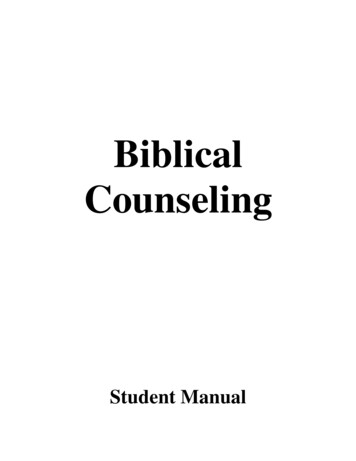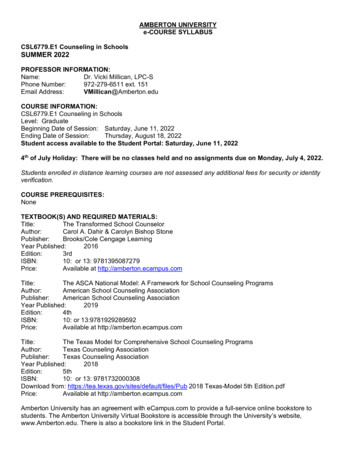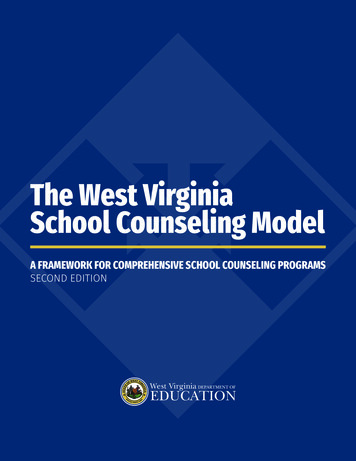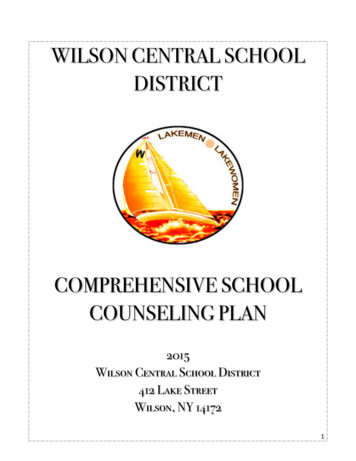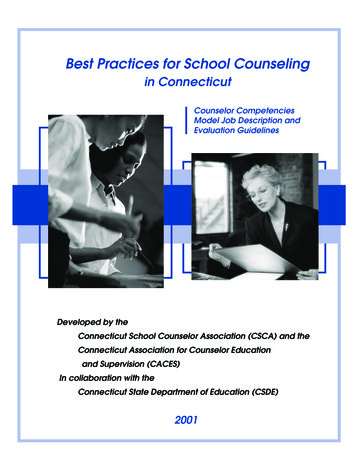
Transcription
Best Practices for School Counselingin Connecticut Counselor CompetenciesModel Job Description andEvaluation GuidelinesDeveloped by the Connecticut School Counselor Association (CSCA) and the Connecticut Association for Counselor Education and Supervision (CACES) In collaboration with the Connecticut State Department of Education (CSDE)2001
Best Practices for School Counselingin ConnecticutCounselor Competencies,Model Job Description andEvaluation GuidelinesDeveloped bythe Connecticut School Counselor Association(CSCA)andthe Connecticut Association forCounselor Education and Supervision(CACES)in cooperation withthe Connecticut State Department of Education(CSDE)i
ii
ContentsPreface. vAcknowledgment. viIntroduction . viiLinking Best Practices with the School Counseling Program Guide 2000 (Chart) viiiFoundations for Establishing a Professional Identity for School Counselors .viiiiSection 1:Foundational Skills and Competencies for the Beginning School Counselor. 1Section 2:Connecticut School Counselor Certification Requirements and Regulations . 3Section 3:Model Format for School Counselor Job Description . 8Section 4:Connecticut Guidelines for the Evaluation of School Counselors . 11Section 5:Standards for Comprehensive School Counseling Programs in Connecticut . 17References . 23iii
iv
PrefaceBest Practices for School Counseling in Connecticut represents the latest collaborative effort between theConnecticut School Counselor Association (CSCA), the Connecticut Association of Counselor Educatorsand Supervisors (CACES) and the Connecticut State Department of Education. This document delineatesbest practices for establishing a comprehensive school counseling program and provides direction to schooldistricts as they develop standards in the areas of school counselor competencies, role definition for schoolcounselors, and the evaluation of school counselors and school counseling programs. The document isbased on the Connecticut Comprehensive School Counseling Program, published in the spring of 2000, andintegrates the program standards with counselor competencies and evaluation standards. A model jobdescription is provided to define appropriate functions and responsibilities of school counselors.School counselors and administrators are encouraged to collaborate in implementing this model that willassist school districts in their mission to prepare all students to meet high academic standards and tobecome productive and contributing members of society in the 21st century. Standards-based,comprehensive school counseling programs have been shown in a variety of studies to produce majorbenefits for students, schools, families and communities. It is our hope that this companion document to theConnecticut Comprehensive School Counseling Program will provide additional guidance in implementingcomprehensive school counseling models in Connecticut schools.Sally SwansonPresidentConnecticut School Counselor AssociationGeorge P. DowalibyChiefBureau of Special Education andPupil ServicesDepartment of EducationWilliam KovachiPresidentConnecticut Association for Counselor EducationAnd Supervisionv
AcknowledgmentsThe Connecticut School Counselor Association, the Connecticut Association of Counselor Educators andSupervisors and the State Department of Education are indebted to the individuals listed below for theirtime, support and dedication to the preparation of this document which is presented as a natural follow-upand partner to the recently distributed, Connecticut Comprehensive School Counseling Program 2000. Wehope that together they will provide direction and support for school counseling programs across our state.Project ManagersNancy Aleman, Education Consultant, Connecticut State Department of EducationPatricia Landers, School Counseling Consultant; Adjunct Faculty, Central Connecticut State UniversityGary Parkman, School Counseling Consultant; Adjunct Faculty, Central Connecticut State UniversityElementary School CounselorsPam Anderson, Elizabeth S. Shelton School, SheltonAndrea Chorney, Highland School, CheshireSusan Judd, Paul E. Chatfield School, SeymourThomas Spiwak, Eli Whitney School, EnfieldRamon Vega, Student Support Services, HartfordMiddle School CounselorsCandace Brohinsky, King Philip Middle School, West HartfordDolores Callegher, Albert D. Griswold Middle School, Rocky HillBob Schmidt, Madison Middle School, TrumbullSusan Stillman, Bolton Center School, BoltonHigh School CounselorsKeats Jarmon, Hall High School, West HartfordSusan Leonard, Cheshire High School, CheshireYves Noiset, Valley Regional High School, Deep RiverSally Swanson, Newington High School, NewingtonCounselor EducatorsDelia Adorno, Adjunct Faculty, Central Connecticut State UniversityKay Campbell, Western Connecticut State UniversityNancy DePalma, Adjunct Faculty, Central Connecticut State UniversityAmy James, Central Connecticut State UniversityTerri Loughead, Southern Connecticut State Universityvi
IntroductionEstablishing Best Practices in School Counseling —Connecticut’s Commitment to Continuous ImprovementThroughout its one hundred year history, the school counseling profession has responded to the political,economic and social changes in American society. Changes in demographics, family structures, expandingcommunication systems, advances in technology and federal and state laws related to the welfare ofchildren, are just a few of the issues that have had an impact on the role of the school counselor and ondefining the parameters of the school counseling program. These types of issues, as well as the lack ofconsistency of school counselor functions from district to district, have contributed to the need to setstandards for the school counseling profession in order to address the challenges that face our schools andchildren in the 21st century.Best Practices for School Counseling in Connecticut is a follow-up document to the ConnecticutComprehensive School Counseling Program 2000, released in the spring of 2000. The standards documentwas developed by a committee of counselor educators from the Connecticut State University system and arepresentative group of school counselors from the elementary, middle and high school levels and is thelatest collaborative effort of the Connecticut School Counselor Association (CSCA), the ConnecticutAssociation of Counselor Educators and Supervisors (CACES) and the Connecticut State Department ofEducation (CSDE).The concept of program standards is not new to the school counseling profession in Connecticut.Connecticut has been, and continues to be a leader in school counseling program development and in theidentification of program standards, which serve as the foundation for comprehensive school counselingprograms. Many documents have been published through the collaborative efforts of CSCA, CACES andthe CSDE to address the issue of defining and supporting school counseling in Connecticut. Thesepublications have addressed a wide range of school counseling issues such as program development, schoolcounselor competencies, school counselor evaluation indicators, school counseling program standards,model programs and an assessment instrument for program development.With the publication of the national standards by the American School Counselors Association in 1997, andthe release of the Connecticut Comprehensive School Counseling Program 2000 in April, to all schoolcounselors, superintendents and pupil personnel directors in Connecticut, it seemed timely to review andrevise the standards for Connecticut school counselors and school counseling programs.These standards provide direction to districts concerning the competencies that can be expected of a firstyear counselor, requirements for Connecticut State certification, role definition based on graduate leveleducation and training, an appropriate evaluation model based on role definition, and standards forestablishing and improving comprehensive school counseling programs.School counselors and administrators are encouraged to collaborate with each other in adopting thesemodels in order to set standards for school counselors and school counseling programs, to developappropriate school counselor job descriptions and evaluation procedures, and to implement comprehensiveschool counseling models that address the needs of all students in the district.vii
Linking Best Practices for School Counseling in Connecticut with theComponents of Connecticut Comprehensive School Counseling ProgramBEST PRACTICESSchoolCounselorCompetenciesCT UMINDIVIDUAL PLANNING Demonstrates ability to design and implement a planned,sequential, and developmentally appropriate schoolcounseling curriculum Demonstrates ability to systematically deliver the schoolcounseling curriculum. Evaluates the impact of instruction and modifies teachingmethods based on feedback Promotes understanding and appreciation for diversity Principles and philosophy of developmental guidance andcounseling Special education: growth and development of exceptionalchildren Practicum experience (one semester) and full-yearinternship in school counseling Designs, delivers, evaluates and revises a planned,sequential, developmentally appropriate program toinclude lessons in the academic, career, personal/socialareas of development Delivers curriculum in systematic manner to all students Facilitates instructional process in collaboration with schoolstaff and community resources Demonstrates knowledge of curriculum topics presentedDesigns, delivers, evaluates and revises a planned,sequential, developmentally appropriate curriculumAddresses written goals and objectives in instructionPromotes a positive learning environmentFacilitates instructional process using school andcommunity resourcesDesigns procedures to measure student outcomesCollaborates with classroom teachers in the delivery of theschool counseling curriculum There is a written curriculum of the school counselinginstructional program delivered and coordinated by schoolcounselors (5) The guidance curriculum promotes instruction thataddresses the three primary content areas of humandevelopment, academic achievement, career developmentand personal/social growth (6) Standards forComprehensivePrograms(1-10)CT CommonCore ofLearningStudents participate in School-To -Career activities throughthe counseling curriculum Students become aware of the world of work, and itsfunction in society, diversity, trends, and requirements Provides lessons that address student responsibility forself and others Provides lessons on conflict resolution and mediationviiiDemonstrates the ability to assist students in establishingpersonal goals and future plans Articulates a method of systematic delivery of individual planningto students appropriate to their age and grade level Demonstrates ability to interpret tests, student data and otherappraisal results Demonstrates knowledge of a variety of appraisal instrumentsand techniques to enhance student decision -making and planningPupil appraisal and evaluation techniquesPsychological and sociological theory related to children, youthand families Career development theo ry and practiceSystematically develops/delivers/evaluates student planning, 612, through individual planning which results in a writteneducational/career plan for each student that is revised andupdated annually Develops and addresses written objectives for individual planningfor each grade level Assists in transition from elementary to middle to high school Informs students/parents about pertinent test results and theirimplications for educational/career planning Provides a systematic approach to individual planning frommiddle school through high schoolAssists students, from middle school through high school, withcourse selection and schedule adjustmentsProvides information and guidance in the selection of schools andcolleges (middle/high school)Develops with each student a written educational/career plan thatis revised and updated annuallyAdministers a career interest inventory to each student that isreviewed with the student and used for planning purposes.Activities and services are provided to assist students inmonitoring and directing their academic achievement, careerdevelopment and personal/social growth (7)Assists students in lifelong preparation and learning through goaldevelopment and written career plans Students explore a range of careers
Connecticut Comprehensive School Counseling Program ComponentsComponents of Connecticut Comprehensive School Counseling ProgramBEST PRACTICESSchoolCounselorCompetenciesRESPONSIVE SERVICESSYSTEMS SUPPORT Demonstrates knowledge of theory, practice andskills for individual and group counselingArticulates theoretical basis for counseling practiceDemonstrates techniques and interventions for usewithin academic, career, personal/social domainsDemonstrates knowledge of the ref erral processAssesses effectiveness of one's counselinginterventions and modifies accordinglyDemonstrates knowledge of ethical code of theprofessional counseling associations (ASCA/ACA) Demonstrates knowledge of school /community resourcesCollaborates with staff and communityInitiates and maintains productive working relationships with students, staff,parents and community agenciesManages time, space, materials of the counseling programDemonstrates knowledge of research and program evaluation met hodsFacilitates use of technologyDemonstrates knowledge of school -based consultationDemonstrates knowledge of state/national program standards and lawsrelated to the school counselor roleCT StateCertification Individual and group counseling skillsPsychological and sociological theory as related tochildren, youth and families Special education: growth and development ofexceptional children Professional code of ethics School -based consultation theory and practiceOrganizational patterns and relationships of PPS to total school programFoundations and context of school counselingResearch and program evaluation techniquesFoundations and contexts of school counselingIssues/trends in multicultural societyJobDescription Conducts goal oriented counseling sessionsMakes referrals to specialists and outside agenciesProvides individual counseling in academic, careerand personal/social developmentProvides intervention/support in crisis situationsAssists parents with students’ school-relatedproblemsProvides group counseling to target populationsProvides information to staff/parents to assist themin student developmentAdheres to preferred state/national practices forschool counselingAdheres to ethical practices of the state andnational professional counseling associations Communicates/consults with staff and parents about studentsArticulates the role of school counselor to school/communityAdvocates for equal access to programs and services for all studentsPlans and coordinates program that ar e an extension of the counselingprogram (college fair, financial aid, etc.)Reviews guidance program annuallyEngages in professional developmentCoordinates parent programs to assist with transition and planning issuesEstablishes a monthly/yearly planning calendarParticipates in school decision makingDemonstrates knowledge of local policies and state and national lawspertaining to school counselingUses technology to enhance the programAssists students with transition issuesParticipates in PPT process when input in neededProvides individual counseling to target populationsInitiates counseling relationshipsDemonstrates skills in terminating counselingrelationshipsClarifies limits of confidentiality to studentsRespects rights/unique characteristics of studentsCounsels in adjustment to a new schoolDemonstrates ethical practicesProvides intervention/support in crisis situationsDemonstrates skills in group guidance andcounseling The procedures, activities and services of theschool counseling program ensure appropriate andtimely response of academic, career andpersonal/social concerns (8) Students take responsibility for their commitmentsand actions Evaluation Standards forCompre hensivePrograms(1-10) CT CommonCore of Learningix Demonstrates knowledge of current practices in school counselingDemonstrates sensitivity to multicultural issuesCoordinates services of the school counseling program and related communityservicesPlans, implements, maintains and evaluates the systems necessary for thesupport/maintenance/improvement of the programOrganizes public relations for the programParticipates in activities which contribute to the effective operation of theschoolCommunicates/collaborates and consults with staff and parentsPursues professional growthArticulates the school counseling programAdvocates for all studentsThe school counseling program is organized, supported, maintained in amanner conducive to its delivery of services, and its continuousimprovement (9) There are (written) identified methods for evaluating the comprehensiveschool counseling program, counselor competencies, and methods forassessing the satisfaction level of those served directly or indirectly by theschool counseling program (10) The foundation for a comprehensive school counseling program isexplained in writing and is in place: (1) philosophy, (2) goals, (3) objectives,and (4) program policies (1-4)Students demonstrate effort and persistence needed to be successful inschool, work and life
ProfessionalIdentityfor the SchoolCounselorEvaluation Process forSchool CounselorsJob Descriptions forSchool CounselorsSchool Counselor CompetenciesTaught by the UniversitiesState of Connecticut School CounselorCertification RequirementsState of Connecticut ComprehensiveSchool Counseling ProgramProgram Standards for ComprehensiveSchool Counseling ProgramsFoundations for Establishing a ProfessionalIdentity for School CounselorsP. Landers and G. Parkman, Assessment Associates, 2001x
Best Practices for School Counseling in Connecticut1Foundational Skills and Competenciesfor the Beginning School CounselorThe following skills and competencies are intended as a guide to the set of skills, attitudes and knowledgethat should be demonstrated before the student in the school counseling program leaves graduate school.Some of the competencies and skills will be monitored at the classroom level in the university and otherswill be observed and recognized in the school counseling internship.CounselingThe beginning school counselor will: demonstrate knowledge of theory, practice and ethical standards relative to individual and groupcounseling; articulate the theoretical basis for one’s own counseling practice; demonstrate appropriate counseling techniques and interventions for use within the academic,career and personal/social domains; demonstrate the ability to provide individual and group counseling services that are appropriate tothe interests, needs, and developmental level of diverse populations and cultures; demonstrate the ability to evaluate and assess the effectiveness of one’s counseling interventionsand modify accordingly; and demonstrate the ability to interpret tests, student data and other appraisal results appropriately inthe counseling environment.ConsultingThe beginning school counselor will: demonstrate knowledge of the theory and practice of school-based consultation; demonstrate the ability to consult and collaborate with teachers, staff, administrators andcommunity-based organizations in understanding and meeting the needs of all students; make appropriate referrals to school and community support personnel; and demonstrate knowledge of a wide variety of appraisal instruments and techniques to enhancedecision making and planning.CoordinatingThe beginning school counselor will: demonstrate knowledge of the school and community resources that complement the provision ofcounseling services. initiate and maintain productive working relationships with students, staff, parents, administrationand community-based organizations. 1
Best Practices for School Counseling in ConnecticutCurriculum ManagementThe beginning school counselor will: demonstrate the ability to design and implement a planned, sequential and developmentallyappropriate school counseling curriculum in accordance with the competencies and indicatorsoutlined by the Connecticut Comprehensive School Counseling Program; demonstrate the ability to deliver the program using systematic approaches; promote understanding and appreciation for diverse populations and cultures; demonstrate the ability to evaluate the impact of instruction; and demonstrate the ability to modify teaching methods based on feedback and evaluation.Individual PlanningThe beginning school counselor will: demonstrate the ability to assist students in establishing personal goals and developing futureplans; and articulate a method of systematic delivery of individual planning to all students appropriate totheir age and grade level.ManagingThe beginning school counselor will: manage time, space, materials and equipment for the provision of the counseling program; understand, organize and facilitate the use of technology; conduct periodic evaluations of the counseling program; and use evaluations of the counseling program to modify programs and activities.ProfessionalismThe beginning school counselor will: demonstrate knowledge of the ethical standards of the American School Counselor Association(ASCA); demonstrate knowledge of the ethical standards of the American Counseling Association.(ACA); demonstrate knowledge of state and national program standards; demonstrate knowledge of the federal and state laws pertinent to the role, function and services ofthe school counselor; and participate in professional development activities. 2
Best Practices for School Counseling in Connecticut2Certification Requirements and Regulationsfor Connecticut School CounselorsThe school counselor endorsement is required for all staff members serving in the employ of a board ofeducation as a school counselor in pre-kindergarten through grade 12. Current requirements for the initialeducator, provisional educator, and professional educator certificates follow. These regulations arescheduled for revision in 2003 (draft regulations also attached). Please note that although the 2003regulations have been approved, changes may occur prior to or after their implementation. There are twomajor differences between the current regulations and the regulations that will replace them in 2003.1. Currently, specific course content is required in seven different subject areas, plus a specia leducation course. In 2003, programs of study should be specifically designed to prepareschool counselors in a developmental model of school counseling and demonstratecompetence in eleven subject areas, plus a course in special education.2. The second area of difference is in the practicum and internship experiences.Currently, regulations require a progression of supervised experiences in counseling andguidance through laboratory and practicum. In 2003, regulations will require a progression offield experiences in elementary and secondary public school settings, with students ofdifferent ages, cultural and linguistic backgrounds and exceptionalities. 3
Best Practices for School Counseling in ConnecticutSTATE OF CONNECTICUTCurrent Certification RegulationsState Board of EducationDSchool CounselorSec. 10-145d-555.When requiredThis certificate is required for a person serving in the employ of a board of education as a schoolcounselor in pre-kindergarten through grade 12 or coordinating school counseling services within a singleschool, except that an intermediate administrator or supervisor certification may be required inaccordance with Section 10-145d-572.Sec. 10-145d-556.Initial educator certificate requirementsTo receive the initial educator certificate to serve as a school counselor, the applicant shall meet thefollowing requirements, in addition to meeting the assessment requirements, as appropriate:(a)Holds a professional educator certificate; or holds or is eligible to hold an initial educatorcertificate, and has had either 30 school months of successful teaching experience or hascompleted a full-time supervised school internship of 10 school months in a school (Pre-Kthrough 12) setting. For the purposes of this section, internship is defined as a full-time placementof a candidate in a school setting, including continued supplementary seminars or prescribedstudy under the supervision of the preparing institution. The internship shall include thecounseling of students, consulting with parents and staff observations and substantialparticipation in classroom instruction, involvement in curriculum development and otherprofessional activities in which a school staff is involved. This internship is in addition to thatrequired in a practicum, as described in subsection (e) below;(b)Holds a master's degree;(c)Has completed, as part of or in addition to the master's degree, a minimum of 30 semester hoursof credit in a planned program in school counseling services as attested to by an institutionapproved for the preparation of school counselors;(d)Presents the recommendation of the preparing institution, which shall be based on evidence ofknowledge, skills and understanding gained from study or experience to be distributed amongeach of the following:(1)(2)(3)(4)(5)(6)(7)Principles and philosophy of developmental guidance and counseling;Psychological and sociological theory as related to children, youth and families;Career development theory and practice;Individual and group counseling procedures;Organizational patterns and relationships of pupil personnel services to total schoolprogram and community;Pupil appraisal and evaluation techniques; andSchool-based consultation theory and practice; 4
Best Practices for School Counseling in Connecticut(e)Presents evidence from the preparing institution of a progression of supervised experiences incounseling and guidance through laboratory and practicum; and(f)A course of study in special education comprised of not fewer than 36 clock hours, which shallinclude study in understanding the growth and development of exceptional children, includinghandicapped and gifted and talented children and children who may require special education,and methods for identifying, planning for and working effectively with special-needs children inthe regular classroom.Sec. 10-145d-557.Provisional educator certificate requirementsTo receive a provisional educator certificate for school counselor, an applicant shall present evidence ofmeeting the preparation and eligibility requirements for an initial educator certificate to serve as a schoolcounselor, in addition to meeting the following requirements:(a)Has successfully completed the BEST assessment, as may have been made available by theBoard, and 10 school months of successful service under the initial educator certificate, interimeducator certificate or durational shortage area permit; or(b)Has completed, within 10 years prior to application, at least 30 school months of successfulteaching as a school counselor in a public school, approved nonpublic school or nonpublic schoolapproved by the appropriate governing body in another state; or(c)Has served a board of education successfully under a provisional teaching or provisional educatorcertificate for the school year immediately preceding application. The subject area or field taughtduring the preceding year shall be the same for which provisional educator certification is sought.Sec. l0-145d-558.Professional educator certificate requirementsTo receive a professional educator certificate for school counselor , an applicant shall present evidence ofhaving met the following requirements:(a)Has completed 30 school months of successful service under the provisional educator certificate,interim educator certificate or provisional teaching certificate; and(b)Has completed 45 semester hours of graduate credit at an approved institution or institutions incounseling and related areas including those required for the initial educator certificate. Thecandidate shall complete a program of additional semester hours of graduate credit designed tostrengthen the skills and knowledge needed for the provisional educator certificate, and to includework in related disciplines such as psychology, sociology and special education. 5
Best Practices for School Counseling in ConnecticutSTATE OF CONNECTICUTCertification Regulations Effective July 1, 2003State Board of EducationPart VSpecial ServicesSchool Counselor, School Psychologist, School Social Worker, Speech and Language PathologistASchool Counselor Endorsement(NEW) Sec. 1O-145d-700. When RequiredThe school counselor endorsement is required for a person serving in the employ of a board of educationas a school counselor in early childhood, elementary, and secondary school settings.(NEW) Sec. IO-I45d-701. Initial Educator Certificate RequirementsTo receive an initial educator certificate endorsed in school counselor, an applicant shall meet thefollowing requirements:(a)Hold a master's
With the publication of the national standards by the American School Counselors Association in 1997, and the release of the Connecticut Comprehensive School Counseling Program 2000 in April, to all school counselors, superintendents and pupil personnel directors in Connecticut, it seemed timely to review and

